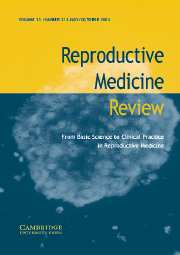No CrossRef data available.
Article contents
The role of antiphospholipid antibodies in reproductive failure
Published online by Cambridge University Press: 03 June 2009
Extract
The relationship between antiphospholipid antibodies and the clinical features of placental insufficiency, pre-eclampsia, and fetal loss has emerged as one of the most exciting new observations in obstetrics in the last 15 years. Antiphospholipid syndrome is the only convincing ‘immunologic’ disturbance of pregnancy affecting the fetus other than anti-erythrocyte or antiplatelet alloimmunization disorders, and it is now routine to test patients with fetal loss for the two best characterized antiphospholipid antibodies, lupus anticoagulant and anticardiolipin. Although there is no proven mechanism for fetal loss, treatment of antiphospholipid antibody-positive mothers during pregnancy with heparin improves pregnancy outcome.
- Type
- Research Article
- Information
- Copyright
- Copyright © Cambridge University Press 1997




